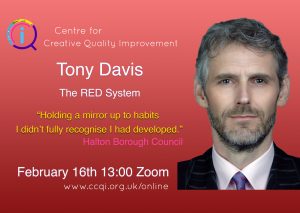An alternative to the bruising observation process

Over this last three weeks I’ve been delighted to be back observing teachers in the thick of the action – live, in person! A complete privilege.. And while observing, something profound happened.
I’ve been doing this professionally for the last 20 years (actually got into teaching by observing a master at work 35 years ago), so ‘profound’ isn’t something that happens often. Let me explain.
You may have seen me write about the CCQI RED System before. This is a research-based approach to improving the impact of teaching and assessment on learning. It’s a replacement for traditional, outdated accountability-style observation systems, and centres on peer observation and professional discussion. And it’s data-rich.
RED is also a ‘no feedback’ system. Observers can only ask questions and present scenarios. The only person allowed to feedback and make judgements is the teacher. It’s a wonderful, robust process teachers engage with wholeheartedly; but we have had one problem.
At the end of the evaluative conversation, the teacher identifies two impacts they weren’t happy with, along with two impacts they want to ‘steal’ from one of their peers’ lessons. Teachers then go on to design a ‘research lesson’ in which they will try something new to achieve their four target impacts. (By the way, RED stands for Research into Education, and Development.)
Now for the problem. Some teachers really enjoy the call-to-action and the process of designing their research lesson, but others can find it hard to dig out some space in their crowded diaries for a little quality thinking time. So I was asked by one of the colleges running RED if I could help.
Here’s the idea. I’ve always loved the idea of turning quality improvement into a ‘soap’, where everyone becomes invested in the outcome of the story. I used to be the inspector who managed the Good Practice Database for the Adult Learning Inspectorate and later, Ofsted. While we tried to centre case studies on individuals, we certainly never got close to what I really wanted. Enter now, the idea of the ‘Me and My Mates’ quality improvement database. Or to give it it’s Sunday name: The RED LISD – ‘The Learning Issues & Solutions Database.
The concept is simple. Ask teachers: ‘If you could wave a magic wand and instantly resolve one of your learning issues/challenges, what would you choose?’ This gives you ‘List 1’. Then, by running The RED System (or actually any of your observation work) you build ‘List 2’: the great practice teachers are using to solve their learning challenges. Are you ahead of me?
You then create a database using ‘Issue-based navigation’. List 1 (the learning issues) becomes a set of clickable headings. List 2 gives you your search returns. Together, this give you the issues you and your mates are having to deal with and the strategies you and your mates have come up with to solve them. ‘Me and My Mates Quality Improvement’.
Now for the profound bit. Traditional, accountability-style observation forces teachers to try their best to hide the challenges they face day in day out – irrespective of senior management rhetoric. But last week, by telling teachers in advance about The RED LISD approach, they did something amazing – they did the opposite. Instead of hiding their challenges, they were keen to discuss them in great detail, because they could see that the new system was designed with only one purpose in mind – to support them.
What do you think? Will you have a go?
I’ll be sharing more outcomes from this approach over the coming months as I refine the model with my lovely partner colleges, but for now, if you’d like to contribute to a national wiki of learning issues then do please head over here: www.ccqi.org.uk/wiki/learning-issues
And if you’d like to learn more about how to run your own RED System, the do please join us for a workshop next Wednesday, February 16th at 1pm. Do please tag any of your mates who might be interested, or share with your own networks. Booking details can be found here: www.ccqi.org.uk/RED, where you can also see a film of it in action.
Here’s just a few of the comments from last week:
- Able, aspirational, motivated, like being a new tutor again with a desire to problem solve.
- Great, lets us problem solve without being told one method and gives us the confidence to say that it can be solved.
- To have the lesson seen and heard without prejudice is really refreshing.
- This will motivate staff to try new ideas, and be more comfortable with colleagues in their classroom without the fear of failure. I also like that it will be a working document for staff to add to so it can evolve.
Hope you can join us. Thanks for reading.
Best wishes
Tony




Comments
No comments yet